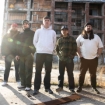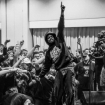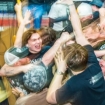"I'm not going to lie to you, I woke up on my couch an hour ago, and I'm finally making myself some coffee. I have not even seen what the outside looks like yet … Hope the sun is at least fairly out."
It's early in the afternoon when Revolver catches Joshua Bosarge on his cell phone, and the vocalist for Houston hardcore unit Lace is lounging near his long-haired dachshund, Peach, with the first of many AeroPresses of the day. From here, the self-professed coffee snob and DIY entrepreneur will handle daily business for his record label/poetry printing house, Calico Grounds, as well as an upcoming venture producing perfume, among other band-adjacent projects. Life is busy, but Bosarge explains that something more severe than a heavy workload is often what's keeping him indoors. "I have pretty tremendous social anxiety — I leave places earlier than I should. Sometimes I just don't go anywhere."
It should come as no surprise, then, that an incalculable sense of isolation permeates Human Condition, Lace's feral full-length debut. Sonically, the group delivers a heady maelstrom of d-beat rhythms and cold post-punk riffing, a dread-stirring combo that complements their frontman's raspy, untethered pledges to distance himself from the rest of the herd. As Bosarge puts it above the slam of the album's "Spectator": "I don't want the future/I don't want this generation spreading its fucking cancer." His critique comes beaded in night sweats — the result of the panic he experienced while making the LP, because "the band was writing songs faster than I could write lyrics."
"I didn't leave my apartment for a month and a half," he continues. "I got my groceries delivered here. I took care of everything from my living room. It got to be really upsetting, and really almost a traumatic experience to be locked away for that long. I told myself, 'I'm not going to leave until I finish these up.'"
"With phones and the internet, you're obviously never really isolated," the singer concedes of the self-imposed confinement, attempting to dial back the drama. But he adds, "Not seeing any other scenery other than my apartment was actually really doing some psychological harm."
It wasn't as easy as reaching out via text or Facebook message when Bosarge was a lonely teen growing up in Needville, Texas, a small city situated 40 miles southwest of Houston with a population of just 3,000. Bosarge, now 30, calls his hometown a place where "you can feel the inequality in the air." Disenfranchised from the football-first community, he turned to music. His first-ever concert doubled as the debut of Synstereo, the nu-metal cover band he sang for. But after running across a magazine ad for Florida metalcore act Poison the Well, he went to the local library — one of the rare spots in Needville with internet access — and fell into his new favorite genre.
"I discovered hardcore completely by accident," Bosarge says. Poison the Well ended up being the gateway to Thursday and American Nightmare. The influence of the latter was poignant, with the Boston group's breakdowns resonating with Bosarge as much as the inky, at times darkly romantic lyrics of frontman Wesley Eisold.
Years later, encouraged by Lace drummer John Baldwin to publish a personal zine, Bosarge took inspiration from Eisold's Heartworm Press and started his own imprint, Calico Grounds. Plans fell through for projects with Unbroken bassist Rob Moran and Dead Cross' Justin Pearson (who both played with Eisold in Some Girls), but the Calico Grounds catalog showcases everything from cassettes by Austin noise-punks Total Abuse, to a book of letters from avant-garde filmmaker and onetime Andy Warhol collaborator Jonas Mekas, to Bosarge's own poetry.
On Human Condition, the lyricist's literary ambitions are on full display as he is just as adept at raging against society as he is at crafting luscious, illustrative lines like "we are still pomegranates, split for seeds" ("Dead Umbrella") or modeling the impressionistic, reverb-caked "Mapplethorpe (The Leper Song)" after the voyeuristic arthouse erotica of Jean Genet's 1950 prison film, Un Chant d'Amour. The vocalist wasn't quite as successful when trying to diversify Synstereo's approach back in the day. "They were basically, like, 'We'll stick to Korn and ICP, and you do your thing," he says of splitting from his first band.
After graduating high school, Bosarge took off for Houston, immersing himself in the Space City's punk and arts scenes. After a brief stint in Austin, he returned to form Lace in 2016. The singer says he doesn't head back to Needville that often. Beyond interacting with his mother, stepfather and brother, he's essentially cut himself off from his past. "I remember seeing an uncle from a previous stepfather at a gas station when I went back home to visit. He pointed at me, [asking] 'Josh?' I just said no and continued on," says Bosarge, "because it's hard for me to give that capacity to people who I don't share that type of love with. I'm realizing how bad it sounds, but I keep the circle of people that I trust very small."
The singer explores a multitude of humanity's defects throughout Human Condition, including "the things that people are failing to accomplish as human beings — that we can look at women or people of color, and in the back of our heads think, You aren't equal. You're not enough of a person for me to give you the same type of respect that I would want for myself."
Despite the pessimistic view of the population at large, Lace — Bosarge, Baldwin, guitarist Craig Mickle and bassist Mark Gilmore — are double stitched into their community. Outside of performing for their peers, members of the band had worked at Houston venue Walter's Downtown, up until its closure earlier this year (the group played the final show at the club). A free record-release party for Human Condition was held this spring at Insomnia Gallery, a spot they're hoping to put on the map as a place for punk shows and art openings, which also doubles as a DIY storefront for Baldwin's Deep End Records.
While he's proud of how Human Condition shaped up, the frontman says he's leery of undertaking another exercise in extreme seclusion for the sake of his lyrics. Bosarge has found his family in Houston, and in Lace. And while he's still got a critical eye fixed on society's ills, he's catching more and more glimpses that his generation might not be as cancerous as it once seemed. He leaves Revolver with one final anecdote describing the resilience he witnessed within Houston's punk scene during the aftermath of Hurricane Harvey.
"Highways were full of water up to the traffic lights, I'd never seen anything that brutal," he says of the 2017 natural disaster. "Friends had their businesses messed up, and some had to sleep at their restaurant because they couldn't get home. Things like that break my heart, but there was a real big outpouring of love and support. Everyone came together and made sure that everyone was taken care of."












